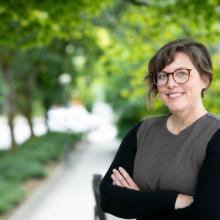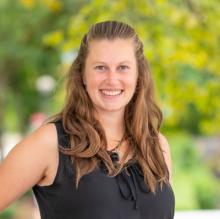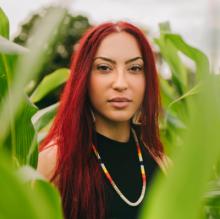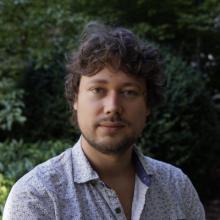Sarah's research highlights the significance of meaningful and emotionally resonant public communication in mitigating climate change. As a case study, and in partnership with the Island Institute in Maine, USA, she focuses on how people perceive risks and benefits associated with offshore wind farms, a technology that could reduce reliance on fossil fuels.
Research Description
I'm motivated by the conviction that we need a vigilant but massive push for energy efficiency and renewable energy alternatives to mitigate climate change. Information on how we get off fossil fuels and responsibly develop alternatives needs to be meaningful and emotionally resonant to diverse audiences to unleash the human potential for creativity and innovation. My research tests the extent to which greater emphasis on aspirational dimensions of switching to renewable electricity, including the scientific, economic and social benefits associated with outcomes, could garner wider public support for renewable energy in general and offshore wind farms in particular. I'm also interested in the success and challenges of community engagement strategies conducted near areas proposed for wind farms. Some specific research questions include: is the public willing to pay more for an offshore wind farm that provides high quality underwater habitat? What lessons can be learned from three New England communities adjacent to proposed offshore wind farms? Specifically, what are best practices when it comes to how developers engage local residents about the trade-offs involved in these proposed developments?
What does being a Public Scholar mean to you?
I seek to bring ideas from academia into how practitioners design community engagement efforts to help local residents consider trade-offs associated with the potential development of offshore wind farms. I am collaborating with a non-profit organization, Island Institute, which has completed several innovative programs, such as exchange programs and investment in local energy leaders from remote islands. I hope to help the non-profit reach a wider audience through an academic publication with them.
In what ways do you think the PhD experience can be re-imagined with the Public Scholars Initiative?
I often heard from practitioners that academia is somewhat of an echo chamber. The sustainability issues that the world faces are immense. I feel an obligation to translate what I've learned as a PhD student into material that can be easily understood and adopted by practitioners seeking to improve energy efficiency and the responsible development of renewable energy.
How do you envision connecting your PhD work with broader career possibilities?
I am looking into career opportunities at the National Renewable Energy Lab (NREL). I also hope to continue collaborating with non-profit organizations like Island Institute after I finish my degree.
How does your research engage with the larger community and social partners?
My research on being up front about the trade-offs involved in developing renewable energy resonates with a wide range of practitioners. I spoke at the 2015 Island Energy Conference in Portland, Maine about the results from my collaboration with Island Institute this past summer. My presentation was on lessons learned from engaging communities near proposed offshore wind farms. Island residents, local politicians, Department of Energy officials, reporters and even my parents attended. Managers of an energy cooperative on Martha's Vineyard Island referenced my survey results in their talk, which followed mine.
Why did you decide to pursue a graduate degree?
I am pursing a PhD because I wanted to become a better scientist. Prior to graduate school, I had mentors who had PhDs and I admired their abilities to address complex sustainability challenges. I also like to learn and have a supportive lab group.
Why did you choose to come to British Columbia and study at UBC?
I chose UBC because my adviser's research interests aligned with my own and I enjoy UBC's proximity to mountains, ocean and temperate rain forest.
I feel an obligation to translate what I've learned as a PhD student into material that can be easily understood and adopted by practitioners seeking to improve energy efficiency and the responsible development of renewable energy.




